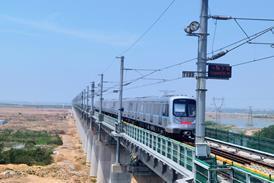
EUROPE: Passenger journey times on the 337 km route between Aarhus in Denmark and Hamburg in Germany could be reduced by 97 min to 2 h 53 min without requiring major infrastructure works, according to a study undertaken by Atkins on behalf of 17 local authorities.
Atkins has produced a series of proposals to speed up services:
- 27 min would be saved if all trains were to travel at the speed of the fastest current DSB and DB services on the corridor;
- 17 min could be saved by reducing the number of stops to five;
- Time would be saved by stopping trains at Flensburg-Weiche station on the direct line, rather than the more central main station which is situated on a loop. This has been agreed by the local authority.
Between 15 and 27 min would be saved as a result of upgrading works planned for 2015-25, including:
- Track doubling underway between Vamdrup and Vojens;
- Electrification and resignalling which is now underway;
- Work to eliminate tight curves which has been approved under Denmark's national project to offer 1 h journey times between main cities.
In the longer term, a tunnel under the Kiel Canal at Rendsburg would eliminate the 4·4 km spiral used to gain height to cross the ship canal on a combined rail and transporter bridge.
The cost of the works in the Flensburg and Rendsburg areas is still to be calculated, but the local authorities are to explore options to develop the scheme.
The reduced journey times would be competitive with Aarhus - Hamburg car journeys, which Atkins says take around 3 h 20 min. Atkins estimates that ridership between Jylland and Hamburg could increase by 500 000 journeys/year, doubling current traffic, and regional passenger journeys could grow by 60%.




















